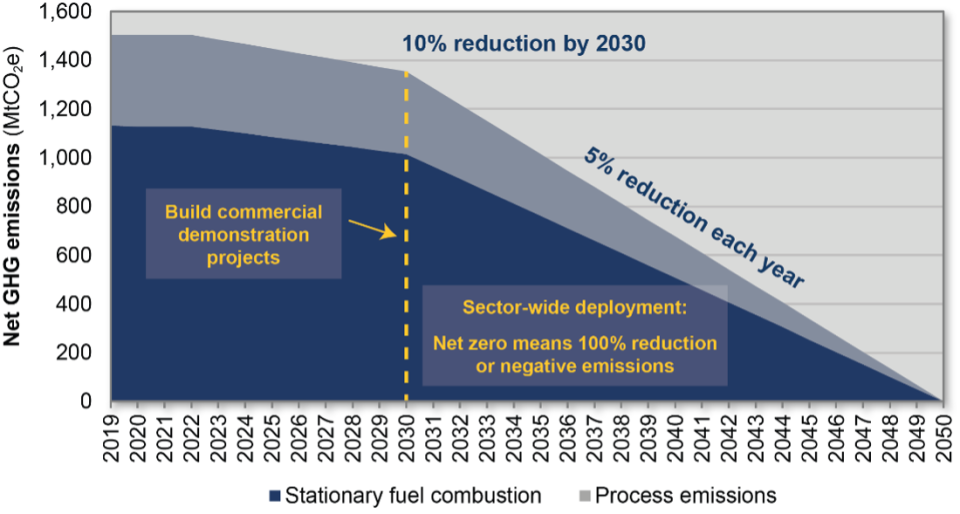Minneapolis, MN/Washington, DC – A new report from the Industrial Innovation Initiative (I3), an industry-labor-NGO partnership, recommends a suite of policies for congressional and state action designed to help American industry decarbonize while retaining high-wage jobs, technological leadership and economic competitiveness.
The report, Decarbonizing Industry by 2050: A Federal and State Policy Blueprint, is the first consensus policy blueprint from I3, an ambitious coalition of industry, environmental, labor, and other stakeholders working with state officials to advance strategies, policies and programs for industrial decarbonization by midcentury. I3 focuses on the industrial sectors of the Midwestern and Gulf States that are home to the greatest concentration of industrial production in the United States.
“The industrial sector – including cement, steel, chemicals, refining, paper and more – is critical to the U.S. economy and is essential to jobs and prosperity, employing nearly 13 million people across the United States. This first-of-its-kind consensus policy blueprint charts a course for industrial sectors to decarbonize through innovation, technology advancement and proactive, incentive-based policies at both the federal and state levels,” said Great Plains Institute Program Consultant Patrice Lahlum, noting that the blueprint builds off earlier work providing economic recovery recommendations I3 provided to Congress in July of 2020.
The new policy blueprint recommendations include:
- Economywide implementation of carbon management—carbon capture, removal, transport, utilization, and geologic storage;
- Production, transport, distribution and use of low- and zero-carbon hydrogen as a fuel and chemical feedstock;
- Procurement that enables government to lead by example to build markets for lower-carbon technologies;
- Electrification of direct emissions, particularly processes using low- and medium-temperature heat;
- Energy efficiency to reduce emissions, lower production costs, reduce risks, and increase competitiveness; and
Applying innovative approaches to increase collaboration among industrial facilities, build markets for new innovations, and examine specific place-based needs to enable industrial decarbonization by midcentury.
Click here to view a fact sheet of the Initiative’s recommendations.
These recommendations to remove carbon from the third-highest carbon emitting sector in the U.S. economy were developed jointly by the I3 members over the past year. They are being released just as the United States looks to make good on its promises at the COP26 Summit and implement the recently passed infrastructure bill.
“I3 participants including industry, labor and NGO leaders realize the critical importance of working together to advance innovative technologies, shape supportive policies and implement solutions to maximize impact. The Blueprint is an effective tool to help guide industrial decarbonization at the state, regional and federal levels toward a lower carbon future,” said Angela Anderson, World Resource Institute Director of Industrial Innovation and Carbon Removal.Decarbonizing industry is vital; however, it also presents a technical and practical challenge. Reducing and eliminating emissions in this sector will not come from a one-size-fits-all solution due to the variability across and among industries in terms of process and products. Adopting processes tailored to different sectors will be key if the U.S. is to meet near- and long-term emissions reductions goals. Failure to cut emissions by the end of this decade will increase the cost of reaching net-zero carbon emissions by 2050. The figure below shows one potential pathway to decarbonization for the industrial sector, should policies be put in place to encourage widespread deployment of technologies and strategies such as the ones outlined in the I3 Policy Blueprint.
A potential decarbonization pathway for the industrial sector

“The U.S. industrial sector has a unique opportunity to become a global leader in technology investment and adoption. Doing so will require diverse stakeholders to engage in the policy process to ensure that the transition to net-zero is equitable and does not endanger the competitiveness of US industries and the communities they support,” said Lahlum, “This consensus blueprint is just the beginning of the industrial sector working together to find common sense decarbonization solutions.”
Click here to read the full I3 Policy Blueprint.
I3 Members include industry leaders such as ArcelorMittal, Dow, Entergy Corporation, Growth Energy, LafargeHolcim and Shell; NGOs including ACEEE, Clean Air Task Force, National Wildlife Federation, The Nature Conservancy and Third Way; and labor leaders such as AFL-CIO, Boilermakers and United Steelworkers. I3 is jointly convened by Great Plains Institute and World Resources Institute.
Below are quotes of support from Industrial Innovation Initiative participants:
“An effective, efficient strategy for decarbonization requires an in-depth consideration of the challenges and opportunities across all sectors of the economy. The policy blueprint unveiled today by the Industrial Innovation Initiative describes an ambitious and necessary policy agenda focused on innovation and complementary deployment strategies that will systematically drive markets for low-carbon technologies across the economy,” – Sasha Mackler, Executive Director, Bipartisan Policy Center
“Hydrogen is a promising option for addressing “hard-to-decarbonize” areas of the industrial sector. This blueprint provides a cohesive and powerful set of federal and state policies that would accelerate development of the markets and infrastructure necessary for low- and zero-carbon hydrogen to decarbonize heavy industry.” — Emily Kent, Policy Manager, Zero-Carbon Fuels, Clear Air Task Force
“Industrial decarbonization has long been a climate blind spot. The recommendations included in this blueprint will help scale carbon management technologies crucial for achieving net-zero emissions in industry. In fact, they could deliver a 13-fold scale up of carbon management capacity by the mid-2030s and make carbon capture and storage viable for the decarbonization of cement and steel industries.” – Lee Beck, International Director, Carbon Capture, Clear Air Task Force
“Growth Energy is proud to work with the Industrial Innovation Initiative as our industry plans to further decarbonize our biorefineries and aid in overall efforts to address climate change. Carbon capture and sequestration projects are an important tool in the ethanol industry’s toolbox to help lower emissions, and we will continue to support policies to promote innovation and encourage investments that will further decarbonize our industry.” – Emily Skor, CEO, Growth Energy
“LanzaTech strongly supports the Industrial Innovation Initiative’s policy blueprint to accelerate industry’s transition to a climate-safe future. Scaling and deploying the new innovations, technologies and supply chains necessary to transition these hard-to-abate industries require thoughtful, supportive policies.” – Tom Dower, Vice President, Public Policy, LanzaTech
“If we’re serious about preventing global temperatures from rising 1.5-2 degrees Celsius, it is critical that we develop comprehensive roadmaps with tangible strategies for policymakers to help responsibly decarbonize hard-to-abate sectors. The National Wildlife Federation supports the federal and state recommendations outlined in the i3 Policy Blueprint, which provides insight into essential steps needed to reduce emissions across the industrial sector and prepare for the inevitable energy transition in a way that benefits both people and wildlife.” – Shannon Heyck-Williams, Senior Director, Climate & Energy Policy, National Wildlife Federation
“Third Way wholeheartedly endorses the recommendations in this policy blueprint that will help abate emissions from some of the hardest industries to address. The Industrial Innovation Initiative has taken a very thorough and robust approach to crafting federal and state policies that will advance solutions like low- and zero-carbon hydrogen; carbon capture, utilization and storage; and government procurement strategies; all of which will be vital for meeting our net-zero emissions goals.” – Ryan Fitzpatrick, Director, Climate and Energy Program, Third Way
“Industrial decarbonization remains a daunting challenge but one that must be pursued. This Policy Blueprint from I3 provides an impactful array of policies to kick-start this transformation while creating new jobs and training the workforce.” – Ed Rightor, Industrial Program Director, American Council for an Energy-Efficient Economy
“RFA endorses the findings and policy recommendations of the I3 Policy Blueprint. It is clear that industry needs to reduce carbon emissions quickly and significantly. Today’s ethanol already reduces lifecycle greenhouse gas emissions (GHG) by 50 percent compared to gasoline, and widespread adoption of carbon management practices by U.S. biorefineries will put ethanol on the fast track toward net-zero carbon emissions. Carbon management in the ethanol industry is one of the most cost-effective and immediate paths for large GHG reductions from the United States industrial sector and provides new investment and job opportunities in rural America.” – Geoff Cooper, President & CEO, Renewable Fuels Association

